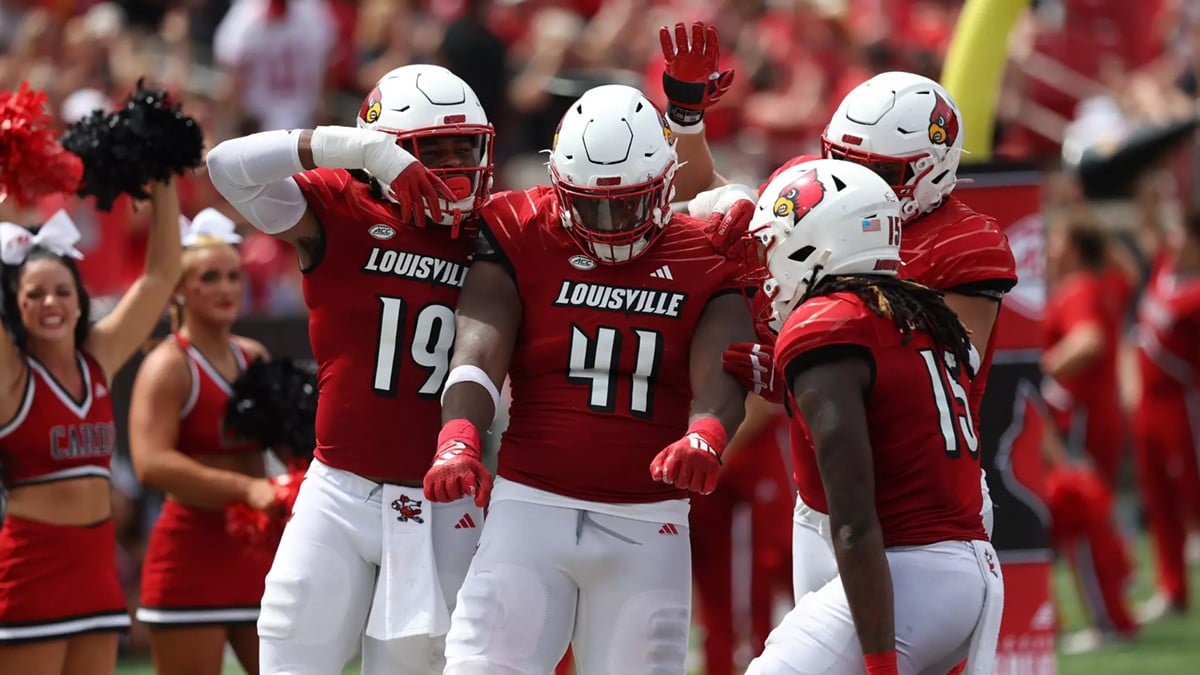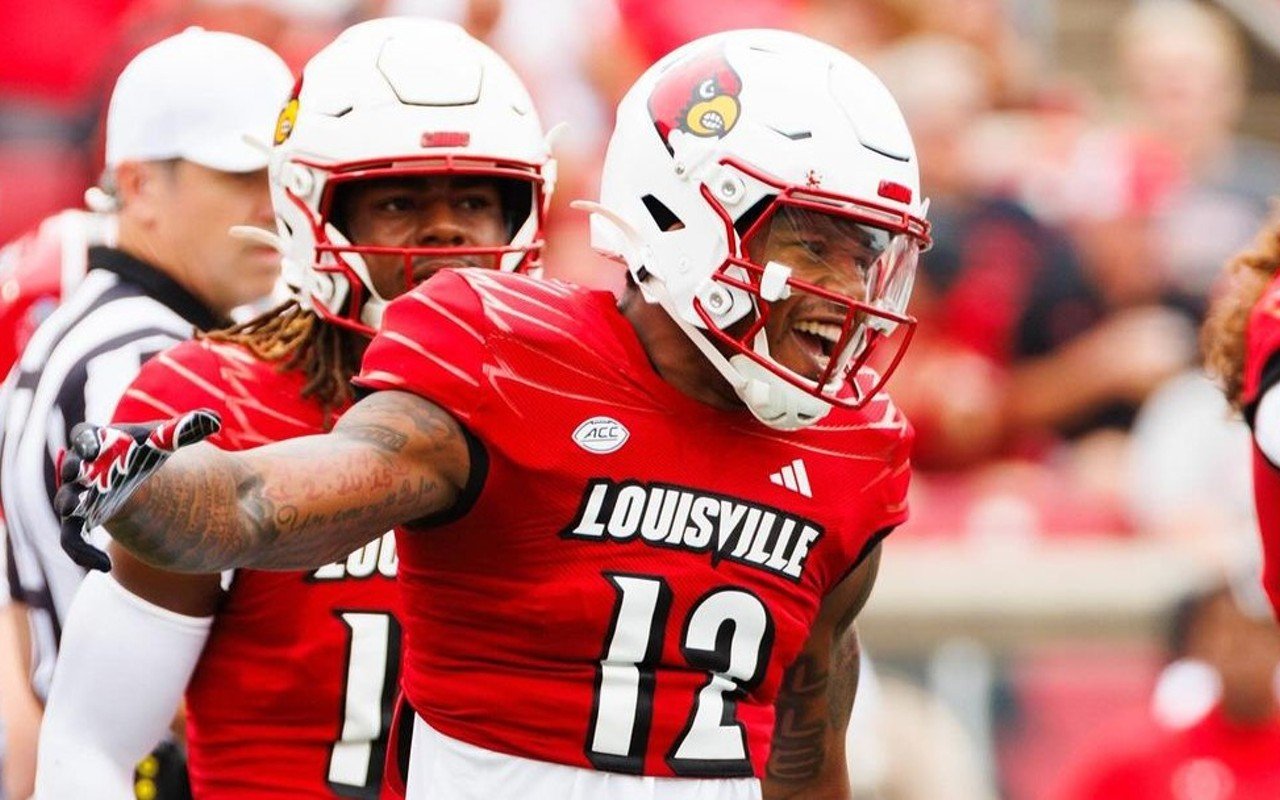The penalty flag was flung while the football was still sailing. Clarence Cotton, the field judge, decided Georgia Tech’s Ahmari Harvey had interfered with Louisville’s Ja’Corey Brooks as they sprinted along the home sideline Saturday afternoon at L&N Stadium.
The infraction proved to be immaterial, but also instructive. For despite Harvey’s excessive contact, Brooks broke free of the cornerback’s coverage by performing an impromptu pirouette, spinning 360 degrees without straying out of bounds, before catching Tyler Shough’s deep pass en route to a tie-breaking 57-yard touchdown reception that would tax the credulity of ESPN’s commentators and an announced crowd of 50,727 during the Cardinals’ 31-19 victory.
While Brooks’ reception rendered Harvey’s penalty irrelevant, it also underscored the profound impact college football’s transfer portal has made on the sport and, more specifically, on U of L. Six of the eight touchdown passes Shough has thrown this season have been caught by teammates who played previously for Alabama (Brooks), Cincinnati (Jadon Thompson) and San Diego State (Mark Redman). Shough, himself a two-time transfer (Oregon & Texas Tech), has completed better than two-thirds of his passes at U of L and has yet to throw an interception.
And with Saturday’s game still in doubt midway through the fourth quarter, Tayon Holloway, late of the University of North Carolina, blocked a Georgia Tech field goal attempt, grabbed the ball in stride as it bounced off the turf, and raced 55 yards for the clinching score. Like Brooks, Holloway has athletic abilities that cannot be taught and can (and did) make a decisive difference in a tight game.
“He’s a dog,” nose tackle Rene Konga said of Holloway. “He goes hard in practice. Incredibly athletic dude. He can play multiple positions in the back end. Some of us, once he got that kick, we knew he was gone, because he’s got that speed in him.”
Embracing the cultural change and Name, Image and Likeness (NIL) incentives that have revolutionized recruiting, U of L coach Jeff Brohm has assembled a cast of hired guns to rival The Magnificent Seven. The standout so far has been Brooks, formerly a five-star recruit who scored 10 touchdowns for Nick Saban at Alabama. He has caught 17 passes in his first three games as a Cardinal and established himself as a target worthy of a tradition that includes such splendid receivers as Deion Branch, Mark Clayton, DeVante Parker and Saturday’s jersey honoree, Harry Douglas.
“He's got some aura around him, for sure,” Shough said. “He's got that juice.”
Since efforts to inhibit college football free agency are probably doomed until the dawn of collective bargaining with union athletes – may we all live that long – the shape of things to come is likely to look a lot like the shape of things currently.
“The transfer portal is here and, whether everyone loves it or not, it’s part of college football, so you have to adapt, and you have to adjust,” Brohm said Saturday. “And for us, we are going to utilize any chance to get our team better if we can.
“We feel like that we’re the type of coaches and we have the type of atmosphere here that if anyone wants to come and try to achieve their goals, we’re going to help them do it. Whether they just got here, whether they’ve been here, our team knows that we’re going to bring in the best teammates we can to help them win.”
Based on cumulative athletic donation between 2005 and 2022, U of L’s NIL potential was ranked 20th among public universities by 247 Sports in August, identical to the school’s current ranking in the AFCA Coaches Poll. Brohm’s sales pitch has thus far produced 13 wins in his 17 games at U of L, including the 3-0 start to the 2024 season that resumes Saturday at Notre Dame. Brohm’s current class of transfers is ranked 15th nationally by 247 Sports, one notch below mighty Georgia, and accounted for 11 of the 22 offensive and defensive starters in Saturday’s game.
“We’re going to be as fair we can and play the best players, and of course, if you’re ready, we’re going to get you in as well,” Brohm said. “With injuries -- we had some today and we had some last week -- at some point you’re going to play, so you just have to trust us. We don’t shy away from the portal. We’re open. Obviously, we want to get the right fit. We want to get somebody who really wants to be here and make a difference.”
This demands some delicacy as well as many dollars. Recruiting veteran players from other programs inevitably means lesser roles for some of those holdovers who have been waiting for their chance to be regulars. This can result in resentments developing within the locker room, and is often seen by those players being passed over as a cue to look for a new place to land. Though much of the movement in college football can be traced to lucrative NIL inducements — thinly disguised and ostensibly forbidden pay for play deals — playing time is also a critical consideration.
“Ultimately, I think, guys just came here to play football, you know what I mean, came here to play some winning football,” said Konga, who played previously at Rutgers. “I think when everybody’s got a common goal in mind, it’s easy to jell, easy to bond as a team. And winning in general also helps your team jell together. I think those two things were very crucial to how the team bonded.”
So far, so good. Better than good, actually.



